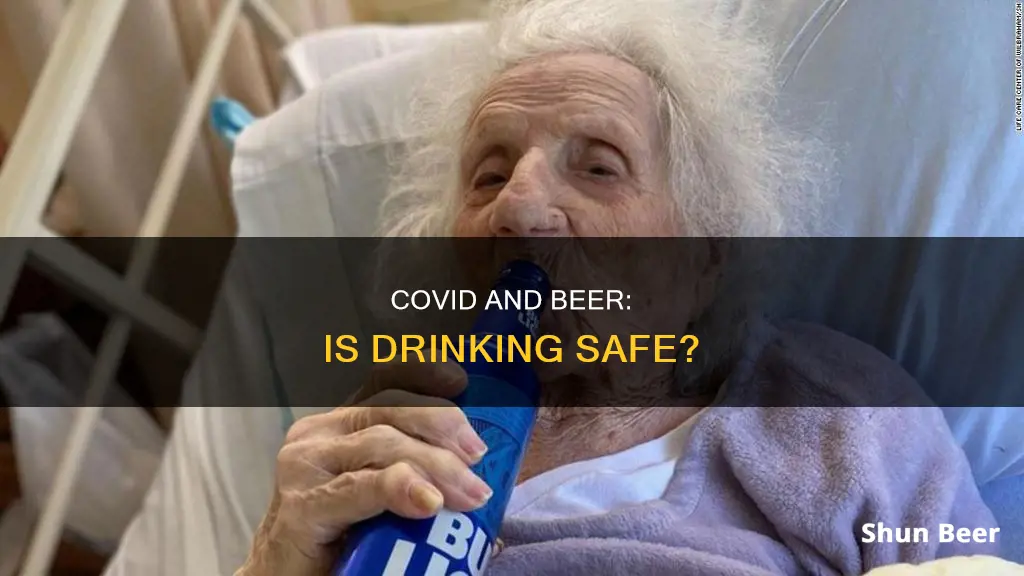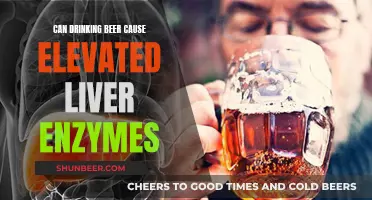
There is no conclusive evidence that consuming alcohol affects the COVID-19 vaccine's effectiveness, but it is known that alcohol weakens the body's ability to fight infections. It is therefore recommended that you refrain from drinking alcohol for a period of time after testing positive for COVID-19 to ensure your immune system is as strong as it can be.
What You'll Learn
- Alcohol does not protect against COVID-19
- Alcohol weakens the body's ability to fight infections
- Drinking alcohol after a COVID-19 vaccine may blunt the immune response
- Alcohol increases the risk of acute respiratory distress syndrome
- Consult a medical professional for advice on drinking alcohol after COVID-19

Alcohol does not protect against COVID-19
Drinking alcohol is particularly dangerous if you are already infected with COVID-19. Alcohol compromises the immune system, making it harder for your body to fight off the virus and increasing the likelihood of long-term symptoms and complications. It is important to give your immune system a boost when you are sick, not weaken it further. Alcohol will only slow down your recovery and may lead to more serious health issues.
There is also evidence to suggest that drinking alcohol can affect the effectiveness of the COVID-19 vaccine. Alcohol may activate ACE2 receptors, which are the same receptors that the COVID-19 virus uses to enter the body. Alcohol consumption can also enhance the harmful effects of the SARS-CoV-2 spike protein, which is the main target of antibodies. While there is no conclusive evidence that alcohol reduces vaccine effectiveness, some studies indicate that young people, chronic drinkers, and those who drink excessively may be at higher risk of complications after receiving the vaccine.
Therefore, it is advisable to limit or abstain from alcohol consumption during the pandemic, especially if you are infected with COVID-19 or have not yet received the vaccine.
Beer and Nyquil: Safe Mix or Health Risk?
You may want to see also

Alcohol weakens the body's ability to fight infections
The immune system is made up of two parts: the innate immune system and the adaptive immune system. The innate immune system provides general immunity by responding to viruses, bacteria, and other microorganisms that can cause disease. The adaptive immune system looks after immune memory, including remembering what a previous infection looked like and stopping it from happening again. Drinking alcohol has a negative impact on both parts of the immune system.
Drinking alcohol can also impact the cells within the airways, reducing their ability to remove mucus from the lungs. This can damage the lung tissue and lead to a weakening of lung function over time. This weakening often goes unnoticed until a severe infection occurs. Heavy drinking can result in a 3-7 times higher vulnerability to serious conditions, like pneumonia, developing from common respiratory tract infections.
Additionally, alcohol use can increase the risk of acute respiratory distress syndrome, which is sometimes associated with COVID-19. Drinking alcohol after getting a coronavirus vaccine can also blunt the immune response and potentially render the vaccine ineffective. While alcohol does not protect against COVID-19, it can alter one's thoughts, judgment, and decision-making behavior, making it harder to adhere to safer gathering practices like wearing a mask and social distancing.
To protect one's health, it is recommended to drink less or abstain from alcohol, especially during the COVID-19 pandemic.
Energy Drinks vs Beer: Which is More Harmful?
You may want to see also

Drinking alcohol after a COVID-19 vaccine may blunt the immune response
While there is no official guidance from the government or Public Health England regarding drinking alcohol before or after receiving a COVID-19 vaccine, some experts advise against it.
Drinking alcohol can weaken your body's ability to fight infections, making it harder to recover if you are sick. Alcohol also increases the risk of acute respiratory distress syndrome and pneumonia, which are sometimes associated with COVID-19.
According to Dr. Elizabeth Connick, chief of infectious diseases at the University of Arizona, moderate alcohol use is associated with better immune responses than no alcohol use or heavy alcohol use. However, heavy drinking can blunt the immune response and potentially render the vaccine ineffective. Heavy drinking could also make it difficult to distinguish between a hangover and vaccine side effects.
Therefore, while moderate drinking after receiving a COVID-19 vaccine will likely not impair the immune response, it is recommended to avoid heavy alcohol consumption to ensure the vaccine's effectiveness.
Drinking Beer After Dental Work: What You Need to Know
You may want to see also

Alcohol increases the risk of acute respiratory distress syndrome
Alcohol consumption can have detrimental effects on multiple organ systems and is a known risk factor for acute respiratory distress syndrome (ARDS). ARDS is a severe form of acute lung injury that usually occurs after a major injury or illness. It is characterised by diffuse activation of inflammatory pathways, resulting in hypoxemia, fluid leakage into the alveolar space, and inflammatory cellular infiltration.
Several studies have confirmed the association between excessive alcohol consumption and an increased risk of developing ARDS. A population-based study found that out of 1,422 critically ill patients, 7% had a history of significant alcohol consumption, defined as more than two drinks per day or more than 14 drinks per week. Among these patients, 13% developed ARDS, compared to only 5% in those who consumed less alcohol or were non-drinkers. The study concluded that a history of chronic and significant alcohol use is a risk factor for developing ARDS in critically ill patients.
The exact mechanisms by which alcohol contributes to ARDS are still being investigated. However, it is known that chronic alcohol abuse can lead to decreased levels of glutathione, a crucial antioxidant, in the lungs. This deficiency of glutathione promotes inflammation and remodelling of lung tissue, making it more vulnerable to oxidative stress and injury. Additionally, alcohol consumption can alter epithelial and endothelial cell function, surfactant synthesis and secretion, and alveolar-capillary barrier function, all of which can contribute to the development of ARDS.
Furthermore, alcohol abuse is also associated with an increased severity of multiple organ dysfunction in patients with septic shock. In a multicenter study involving 220 critically ill patients, those with a history of chronic alcohol abuse had a significantly higher incidence of ARDS (70%) compared to those without such a history (31%). Even after adjusting for various factors, chronic alcohol abuse remained a significant risk factor for ARDS and increased the severity of non-pulmonary organ dysfunction.
The Magic Inside Beer Cartridges: How Do They Work?
You may want to see also

Consult a medical professional for advice on drinking alcohol after COVID-19
There is currently no official advice or conclusive evidence regarding drinking alcohol after recovering from COVID-19. However, it is important to consult a medical professional for personalized advice, especially if you have other health conditions.
Alcohol consumption is known to compromise the immune system, making it harder for your body to fight infections and recover from illnesses like COVID-19. Even when asymptomatic, some people develop long-haul COVID, so it may be wise to refrain from alcohol for a period of time to ensure your immune system is strong.
Additionally, alcohol can alter your thoughts, judgment, and decision-making abilities, potentially leading to unsafe behavior or difficulty adhering to safety measures like mask-wearing and social distancing. It is crucial to prioritize your health and well-being during and after recovery from COVID-19.
If you are considering drinking alcohol after recovering from COVID-19, it is essential to seek guidance from a healthcare professional. They can provide personalized advice based on your medical history and any other relevant factors. Remember, consulting a doctor is always the best course of action when it comes to your health.
While there may not be specific guidelines regarding alcohol consumption after COVID-19, a medical professional can assess your individual circumstances and provide tailored recommendations. They can also offer advice on any necessary precautions or steps to ensure your safety and well-being.
Beer and Milk: A Healthy Mix?
You may want to see also
Frequently asked questions
There is no evidence to suggest that you can never drink beer again after recovering from Covid. However, it is recommended that you refrain from drinking alcohol for a period of time to ensure your immune system is as strong as it can be. Alcohol weakens your body's ability to fight infections and can increase the risk of developing long Covid.
It is not recommended to drink alcohol while you are sick with Covid. Alcohol weakens your body's ability to fight infections, increasing the risk of complications, and making it harder to get better.
There is no official advice to avoid drinking alcohol after getting the Covid vaccine. However, alcohol does affect the immune system, and some research suggests that people who drink excessive amounts may have adverse effects if they drink alcohol after getting the vaccine.
No, you should not go to the pub if you have Covid, even if you plan to drink beer. You should stay home and self-isolate to avoid spreading the virus to others.







